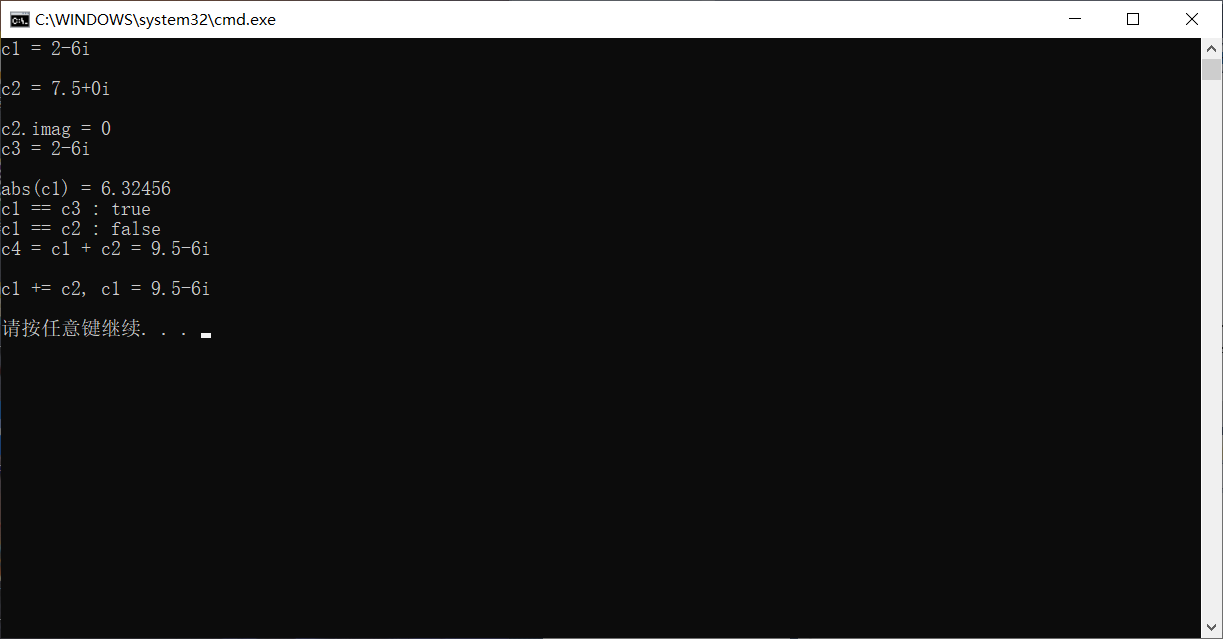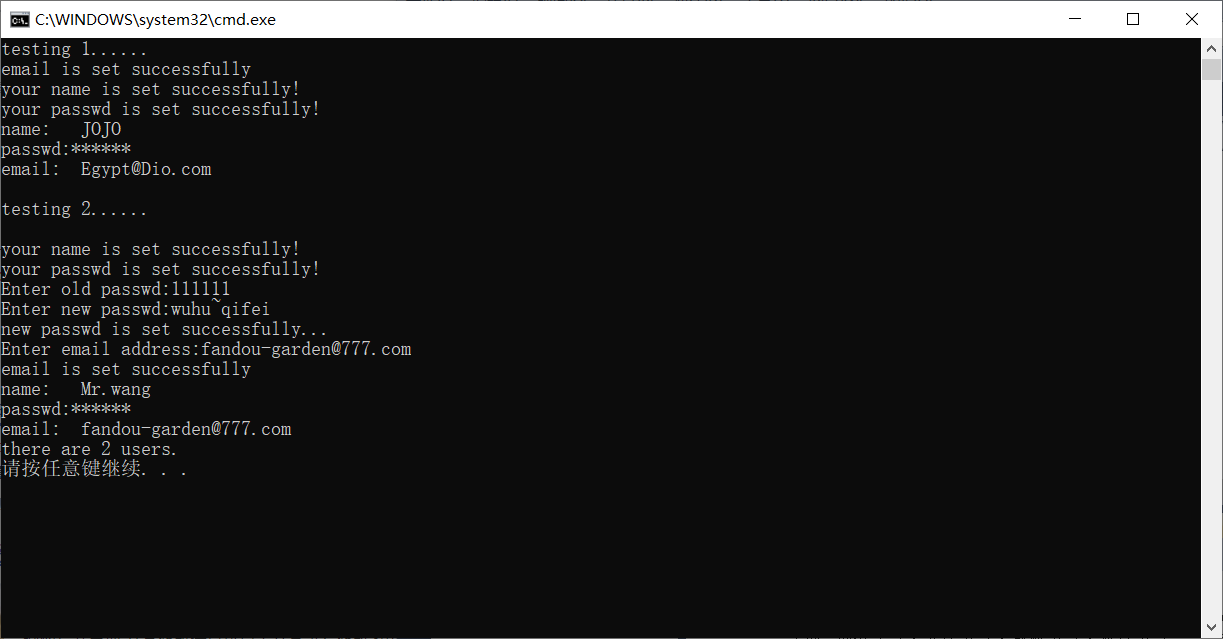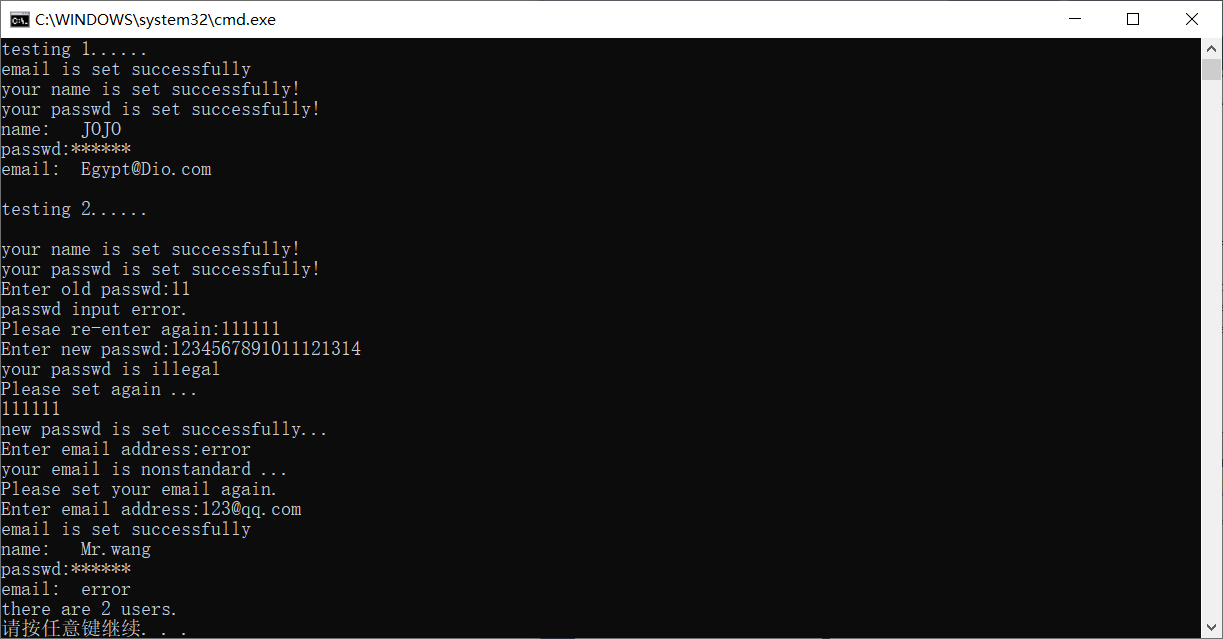面向对象实验一:类与对象
任务三:
complex.h:
#include<math.h> #include<iostream> class complex { private:double r,i; public:complex(){}; complex(double x,double y=0.0):r(x),i(y){}; complex(complex const &p){ i=p.i; r=p.r; } double get_real()const{return r;}; double get_imag()const{return i;}; void show()const{ if(i>=0) std::cout<<r<<"+"<<i<<"i"<<std::endl; else std::cout<<r<<i<<"i"<<std::endl; } void add(complex const &c1){r+=c1.r;i+=c1.i;}; friend complex add(complex const &c1,complex const &c2) { complex c3; c3.r=c1.r+c2.r; c3.i=c1.i+c2.i; return c3; } friend bool is_equal(complex const &c1,complex const &c2) { if(c1.r==c2.r&&c1.i==c2.i) return true; else return false; } friend double abs(complex const &c1) { double m,n; m=c1.i*c1.i; n=c1.r*c1.r; return sqrt(m+n); } };
task3.cpp:
#include "complex.h" #include <iostream> int main() { using namespace std; complex c1(2, -6); const complex c2(7.5); complex c3(c1); cout << "c1 = "; c1.show(); cout << endl; cout << "c2 = "; c2.show(); cout << endl; cout << "c2.imag = " << c2.get_imag() << endl; cout << "c3 = "; c3.show(); cout << endl; cout << "abs(c1) = "; cout << abs(c1) << endl; cout << boolalpha; cout << "c1 == c3 : " << is_equal(c1, c3) << endl; cout << "c1 == c2 : " << is_equal(c1, c2) << endl; complex c4; c4 = add(c1, c2); cout << "c4 = c1 + c2 = "; c4.show(); cout << endl; c1.add(c2); cout << "c1 += c2, " << "c1 = "; c1.show(); cout << endl; }
运行结果:

任务四:
user.hpp:
#include<iostream> #include<string> using namespace std; class user { private:string name,passwd,email; static int users; public:user(string a,string b="111111",string c=""){ if(c!="") fixe(c); email=c; for(;a.length()>16;) { cout<<"your name is illegal"<<endl; cout<<"Please set again ..."<<endl; cin>>a; } name=a; cout<<"your name is set successfully!"<<endl; fixp(b); passwd=b; cout<<"your passwd is set successfully!"<<endl; users++; }; ~user(){users--;}; void fixe(string c){ string s1="@",s2=".com"; string::size_type idx,idy; idx=c.find(s1); idy=c.find(s2); for(;idx==string::npos||idy==string::npos;) { cout<<"your email is nonstandard ..."<<endl; cout<<"Please set your email again."<<endl; cout<<"Enter email address:"; cin>>c;
idx=c.find(s1);
idy=c.find(s2); } cout<<"email is set successfully"<<endl; } void fixp(string b) { for(;b.length()>16;) { cout<<"your passwd is illegal"<<endl; cout<<"Please set again ..."<<endl; cin>>b; } } void set_email(){ cout<<"Enter email address:"; string c; cin>>c; fixe(c); email=c; }; void change_passwd(){ int i; string s; cout<<"Enter old passwd:"; cin>>s; for(i=1;i<=2;i++) { if(s!=passwd) { cout<<"passwd input error."<<endl; cout<<"Plesae re-enter again:"; cin>>s; } if(passwd==s)
break; } if(i==3) cout<<"Please try after a while."<<endl; else { cout<<"Enter new passwd:"; cin>>s; fixp(s); passwd=s; cout<<"new passwd is set successfully..."<<endl; } }; void print_info(){ cout<<"name:\t"<<name<<endl; cout<<"passwd:******"<<endl; cout<<"email:\t"<<email<<endl; }; static void print_n(){cout<<"there are "<<users<<" users."<<endl;}; }; int user::users=0;
task4.cpp:
#include "user.hpp" #include <iostream> int main() { using namespace std; cout << "testing 1......" << endl; user user1("Jonny", "92197", "xyz@hotmail.com"); user1.print_info(); cout << endl << "testing 2......" << endl << endl; user user2("Leonard"); user2.change_passwd(); user2.set_email(); user2.print_info(); user::print_n(); }
运行结果:
示例1、

示例2、

task3小结:
惨痛的教训,对于class的定义时结尾处花括号(})后一定有结束符(;),否则会导致编译器认为main函数也是定义的对象,这点因为之前主要打if,for语句,对于“;”很少在意。
然后就是const的限定,由于权限只能减小,导致主函数中有一个对象带有const,你的程序就要进行一系列的限定,这点虽然是为了保护数据,但const的限定会导致一些数据功能无法实现
task4小结:
这个应该是目前做的最有实际意义的小程序了,除了老师要求的必要条件外,还增加了对名字,密码,邮箱部分合法性(长度、邮箱是否含有(@、.com))的检测
之所以是部分,主要是能力不够,有idea做不出,比如对名字敏感词的屏蔽,这个如果一个个输入是不现实的,应该要有一个数据库进行检测,
之后是密码复杂度的检索,这个要求程序员对string要有熟练的运用,很遗憾,我就是不熟练的那个。
还有对于重名用户的处理,不知道对于大量数据该如何解决等等,只能说程序员的路还很长。
然后其他的感悟就是对这个网站的使用吧,感觉很古朴,而且有一些不好用,比如不能直接粘贴图片,代码框不能删除,只能自己手动修改之类的(也许可以快进到自己编写网站?)
反馈(?):希望老师能多出关于软件功能的实验,一学期之后拼拼凑凑说不定软件工程的软件都做出来了。






